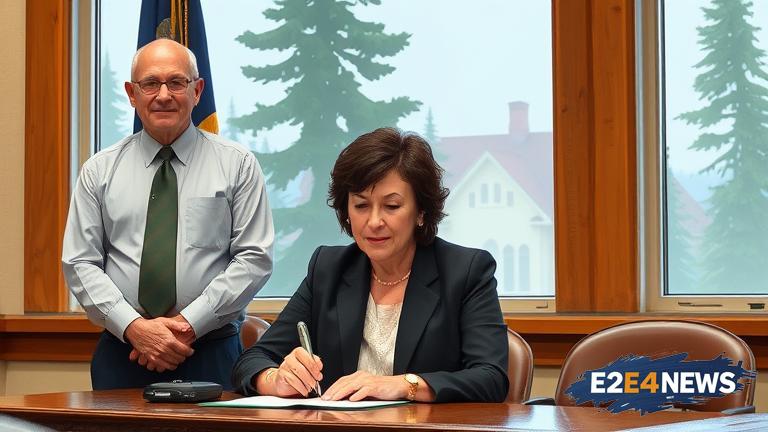In a move that is expected to have far-reaching implications for the state’s energy landscape, Oregon Governor Tina Kotek has signed a series of bills aimed at improving energy affordability, boosting housing construction, and enhancing power utilities. The new legislation is designed to address the growing concerns of Oregon residents who are struggling to pay their energy bills, while also promoting the development of more sustainable and efficient energy systems. One of the key bills signed by Governor Kotek focuses on energy affordability, with provisions aimed at reducing the financial burden of energy costs on low-income households. The bill includes measures such as increased funding for energy assistance programs, as well as incentives for utilities to invest in energy-efficient technologies. Another bill signed by the Governor is geared towards boosting housing construction, with a focus on affordable and sustainable housing options. The legislation includes provisions to streamline the development process, reduce regulatory barriers, and provide financial incentives for builders who incorporate energy-efficient features into their projects. In addition to these bills, Governor Kotek also signed legislation aimed at enhancing power utilities, with a focus on promoting the development of renewable energy sources and reducing the state’s reliance on fossil fuels. The bill includes measures such as increased funding for renewable energy projects, as well as incentives for utilities to invest in energy storage and grid modernization. The signing of these bills is seen as a major victory for environmental advocates and community groups, who have been pushing for greater action on energy affordability and sustainability. The new legislation is also expected to have a positive impact on the state’s economy, with the creation of new jobs and investment opportunities in the energy and construction sectors. Governor Kotek has stated that the signing of these bills is just the first step in a broader effort to address the state’s energy challenges, and that she will continue to work with lawmakers and stakeholders to develop and implement new policies and programs. The Governor is set to hold a Q&A session in Hillsboro and Portland, where she will discuss the new legislation and answer questions from residents and business leaders. The event is expected to be well-attended, with many individuals and organizations eager to learn more about the implications of the new bills. In terms of the specific provisions of the bills, the energy affordability legislation includes a range of measures such as a low-income energy assistance program, which will provide financial assistance to eligible households to help them pay their energy bills. The program will be funded through a combination of state and federal funds, as well as contributions from utilities and other stakeholders. The bill also includes incentives for utilities to invest in energy-efficient technologies, such as smart meters and energy-efficient appliances. The housing construction bill, on the other hand, includes provisions such as streamlined permitting and approval processes, as well as financial incentives for builders who incorporate energy-efficient features into their projects. The bill also includes measures to promote affordable housing options, such as inclusionary zoning and community land trusts. The power utilities bill includes measures such as increased funding for renewable energy projects, as well as incentives for utilities to invest in energy storage and grid modernization. The bill also includes provisions to promote the development of community solar programs, which will allow residents and businesses to invest in and benefit from renewable energy projects. Overall, the signing of these bills marks a significant step forward for Oregon’s energy landscape, and is expected to have a positive impact on the state’s residents, economy, and environment. The new legislation is seen as a model for other states to follow, and is expected to play a key role in promoting a more sustainable and equitable energy future. As the state moves forward with the implementation of these bills, residents and stakeholders will be closely watching to see how the new legislation is put into practice, and what impact it will have on the ground. The Governor’s Q&A session is expected to provide valuable insights into the new legislation, and will offer a unique opportunity for residents and business leaders to engage with the Governor and learn more about the implications of the new bills. In conclusion, the signing of these bills is a major milestone for Oregon, and marks a significant step towards a more sustainable and equitable energy future. The new legislation is expected to have a positive impact on the state’s residents, economy, and environment, and will serve as a model for other states to follow.
